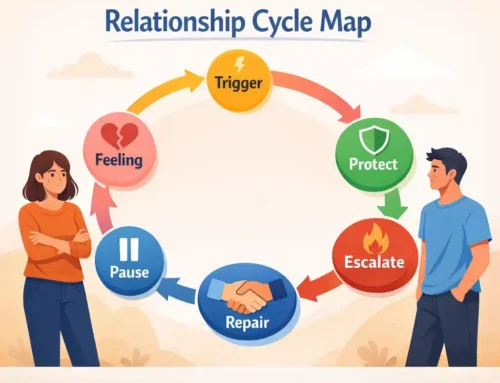
Approx. read time: 6.3 min.
Post: Is Honesty Really the Best Recipe in a Relationship?
We’re all told from a young age that honesty is the best policy—especially in relationships. It’s framed as the golden rule for love, the thing that separates the real from the fake. And while that’s mostly true, the conversation often stops too soon. Honesty isn’t a magic solution. It’s a tool, and like any tool, how you use it matters just as much as having it.
So, is honesty really the best recipe in a relationship?
Yes—but only when it’s used with care, timing, and emotional intelligence. Because honesty alone won’t save a relationship, and the wrong kind of honesty can break one.
Why Honesty Matters
Let’s start with the obvious: honesty builds trust. If you’re with someone and constantly second-guess what they say or feel, that relationship won’t last long. You can’t feel secure if the foundation is shaky. Whether you’re just starting out or ten years deep into something serious, you need to feel like what’s being said is real. No games, no guesswork.
When people know they can speak openly and hear the truth in return, everything else becomes easier. Conversations flow, conflict is more productive, and both people are free to be themselves. That’s the kind of honesty that creates connection, not just communication.
But here’s where it gets tricky.
Honesty Without Tact Is Just Rudeness
There’s a big difference between being honest and being harsh. A lot of people say they’re “just being honest” when really they’re just unloading their opinions without thinking about how the other person will feel.
Saying something like, “You’re overreacting,” or “You always do this,” might be what you’re thinking, but it’s not necessarily helpful—or even fair. Honesty without empathy becomes criticism. And criticism—especially if it feels constant or one-sided—doesn’t build trust. It breaks it down.
Good honesty isn’t about venting everything that crosses your mind. It’s about telling the truth in a way that brings clarity, not chaos.
Timing and Tone: The Unsung Heroes
Here’s what doesn’t get said enough: timing and tone are everything. You could have the most honest insight in the world, but if you drop it at the wrong time or in the wrong tone, it will land wrong.
Let’s say your partner just got home after a long, draining day. They’re clearly stressed. That might not be the best time to say, “We need to talk about something that’s been bothering me.” The message might be valid, but the moment isn’t right.
Or imagine saying, “I need more support from you,” versus, “You never support me.” Same truth, totally different impact.
Being honest isn’t just about what you say—it’s how and when you say it.
When Honesty Hurts More Than It Helps
There are moments when too much honesty—or the wrong kind—can actually cause harm. That’s not to say lying is the answer. But sometimes, people overestimate the value of being completely open about every thought, feeling, or criticism.
For example, do you need to tell your partner you find someone else attractive? Maybe. But maybe not. Is it helping the relationship? Is it necessary, or just self-serving?
That’s the key question: Is this honesty serving a purpose, or is it just something you want to get off your chest?
Healthy honesty is intentional. It’s about making the relationship stronger, not putting someone down or stirring up drama. Before speaking, it’s worth asking: Is this kind? Is it necessary? Is it helpful?
Emotional Safety: The Real Goal
The point of being honest in a relationship isn’t to score points for being brutally real. It’s to build emotional safety. When both people feel safe to speak their truth—without fear of judgment, mockery, or punishment—then you’ve got something solid.
That kind of space doesn’t come from blunt honesty alone. It comes from consistency, respect, and knowing the other person won’t weaponize your vulnerability.
So honesty isn’t just about telling the truth. It’s about creating an environment where truth can exist without fear.
What About White Lies?
This is where things get murky. Are white lies ever okay in a relationship?
Depends on the context. If your partner asks, “Do I look okay?” and you say, “Yeah,” even if you don’t love the outfit—what matters more is how you’re showing support. If it’s something that’s not hurting anyone, and it’s being said out of love, most people are okay with those little truths being softened.
But if you’re telling bigger lies—or hiding things that impact your partner’s ability to make informed decisions—that’s not harmless. That’s avoidance.
There’s a difference between kindness and deception. White lies should protect feelings, not protect secrets.
The Balance: Honesty + Emotional Intelligence
So what actually works best?
It’s the combo of honesty and emotional intelligence. Being able to speak the truth in a way that considers your partner’s feelings and the context of the situation. Being real, but not reckless.
This means:
- Speaking up when something matters, even if it’s hard.
- Holding back when your honesty would do more harm than good and isn’t necessary.
- Choosing your words carefully, especially in moments of conflict.
- Listening just as much as you talk, and creating space for your partner to be honest too.
If honesty is the engine, emotional intelligence is the steering wheel. One without the other is a crash waiting to happen.
What Happens When Honesty Is Missing?
When people don’t feel like they can be honest, resentment builds fast. Problems don’t get solved because they never get named. Needs go unmet. And worst of all, the distance between two people grows, even if they’re physically close.
On the flip side, constant, unfiltered “honesty” without compassion makes people defensive. Instead of feeling safe, they feel attacked. Instead of opening up, they shut down.
That’s why real honesty—the kind that fuels deep connection—is a balancing act. And it’s one that takes practice.
The Bottom Line
So, back to the original question: is honesty really the best recipe in a relationship?
Yes—but only when you know how to use it.
Honesty is a foundation, not a fix-all. On its own, it won’t save a relationship. But without it, you don’t have a real relationship at all—just two people playing roles, guessing what’s true, and hoping it all works out.
The most solid relationships are the ones where truth is welcome—but where it’s also wrapped in respect, patience, and understanding. Where both people can speak their minds and also listen. Where being honest doesn’t mean being cruel, and being kind doesn’t mean being fake.
If you want something real, honesty is essential. Just don’t forget everything that has to come with it.
Related Videos:
Related Posts:
Top 10 Lessons I Believe Parents Should Teach Their Kids for Wisdom, Happiness, and a Better Life
Elon Musk’s Unique Interview Question to Uncover Honesty and Problem-Solving Skills
Increase User Engagement & Why It Matters for SEO
Self-Care Shenanigans: A Hilariously Honest Guide to Finding Your Zen Amidst the Chaos










